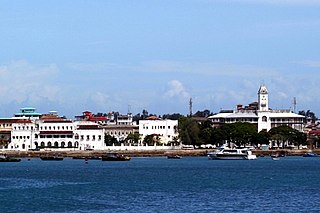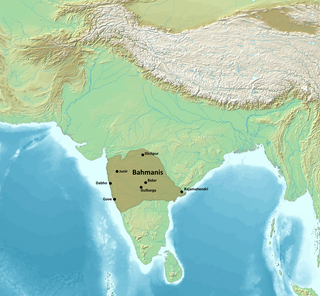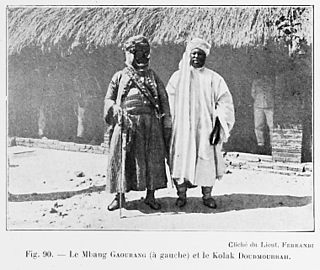
Sultan is a position with several historical meanings. Originally, it was an Arabic abstract noun meaning "strength", "authority", "rulership", derived from the verbal noun سلطة sulṭah, meaning "authority" or "power". Later, it came to be used as the title of certain rulers who claimed almost full sovereignty without claiming the overall caliphate, or to refer to a powerful governor of a province within the caliphate. The adjectival form of the word is "sultanic", and the state and territories ruled by a sultan, as well as his office, are referred to as a sultanate.

Stonetown of Zanzibar, also known as Mji Mkongwe, is the old part of Zanzibar City, the main city of Zanzibar, in Tanzania. The newer portion of the city is known as Ng'ambo, Swahili for 'the other side'. Stone Town is located on the western coast of Unguja, the main island of the Zanzibar Archipelago. Former capital of the Zanzibar Sultanate, and flourishing centre of the spice trade as well as the Indian Ocean slave trade in the 19th century, it retained its importance as the main city of Zanzibar during the period of the British protectorate. When Tanganyika and Zanzibar joined each other to form the United Republic of Tanzania, Zanzibar kept a semi-autonomous status, with Stone Town as its local government seat.
The Masalit are an ethnic group inhabiting western Sudan and eastern Chad. They speak the Masalit language.

The Bahmani Sultanate was a Muslim empire that ruled the Deccan Plateau in South India. The Bahmani Sultanate came to power in 1347 during the Rebellion of Ismail Mukh after Ismail Mukh abdicated in favour of Zafar Khan, who would establish the Bahmani Sultanate. The Bahmani Sultanate was in perpetual war with its neighbors, including its rival, the Vijayanagara Empire.

The Islamization of the Sudan region (Sahel) encompasses a prolonged period of religious conversion, through military conquest and trade relations, spanning the 8th to 16th centuries.

The Wadai Sultanate, sometimes referred to as the Maba Sultanate, was an African sultanate located to the east of Lake Chad in present-day Chad and the Central African Republic. It emerged in the seventeenth century under the leadership of the first sultan, Abd al-Karim, who overthrew the ruling Tunjur people of the area. It occupied land previously held by the Sultanate of Darfur to the northeast of the Sultanate of Baguirmi.

Ouaddaï or Wadai is a region of Chad, located in the south-east of the country, with its capital at Abéché. Prior to 2002 it was known as Ouaddaï Prefecture; in 2008 the southern portions of Ouaddaï were split off to become the new Sila Region.
Dar Sila is the name of the wandering sultanate of the Dar Sila Daju, a multi-tribal ethnic group in Chad and Sudan. The number of the people in this group exceeds 50,000. They speak the Sila language, a Nilo-Saharan language. Most members of this ethnic group are Muslims.
Dār Fertit is a historical term for the lowlands south of Darfur and east of the highlands in the east of the modern-day Central African Republic that contain tributaries of the White Nile River. This region included parts of southwestern Sudan and northwestern South Sudan. In the present era, Fertit is a catch-all word for non-Dinka, non-Arab, non-Luo, non-Fur groups and tribes in Western Bahr el Ghazal, South Sudan. Even though these groups often speak different languages and have a history of inter-tribal violence, they have become more unified over time, mostly out of opposition to the Dinka people.
Jamāl al-Dīn Abū al-Ḥajjāj Yūsuf ibn al-Zakī ʻAbd al-Raḥmān ibn Yūsuf ibn ʻAbd al-Malik ibn Yūsuf al-Kalbī al-Quḍā’ī al-Mizzī,, also called Al-Ḥāfiẓ Abī al-Ḥajjāj, was a Syrian muhaddith and the foremost `Ilm al-rijāl Islamic scholar.

Ali Mughayat Syah was the first Sultan of Aceh Darussalam in Northern Sumatra, reigning from about 1514 until his death. His reign not only saw the foundation of the Aceh Sultanate, but also the conquest of neighboring Daya (1520), Pidie (1521), and Pasai (1524). Despite his accomplishments, Ali Mughayat's life is poorly documented and must be pieced together from various Acehnese, Malay and European accounts.
Joseph Albert Kéchichian is a political scientist.

The Sultanate of Siak Sri Indrapura, often called Sultanate of Siak, was a kingdom that was located in the Siak Regency, Riau from 1722 to 1949. It was founded by Raja Kechil, who was from the Johor Kingdom, after he failed to seize the throne of the Sultanate of Johor. The polity expanded in the 18th century to encompass much of eastern Sumatra as it brought various communities under its control through warfare and control of trade between the interior of Sumatra and the Melaka Straits. The Dutch colonial state signed a series of treaties with Siak rulers in the 19th century, which reduced the area of state influence to the Siak River. For the remainder of the Dutch colonial era, it operated as an independent state with Dutch advisors. After Indonesia's Independence was proclaimed on 17 August 1945, the last sultan of Siak declared his kingdom to join the Republic of Indonesia.
Kobbei is a former town in North Darfur of western Sudan, west of Al-Fashir. It is now deserted. At its peak in the 19th century it was a thriving town, the largest in Darfur, with a population of up to 8,000. It declined as the wells at the oasis dried up, and the caravans first slowed, due to conflicts with al-Zubayr Rahma Mansur to the south, and then stopped with the fall of the Darfur Sultanate in 1874. The ruins are located west of Jabal Kobbei along the Wadi Kobbei for approximately two miles.

Muhammad Salih bin Yusuf, known as Dud Murra or Dudmurrah, was the last independent ruler, or kolak, of the Wadai Empire. He allied with the Sanusi, powerful traders of the eastern Sahara, and with the Sultan of Darfur to resist French aggression in the eastern Sahel, but was defeated. His sultanate was incorporated in the French military territory of Chad.

Dar al Kuti was an Islamic state in the center and northwest of the present Central African Republic which existed from around 1830 until 17 December 1912. From around 1800 the name Dar al-Kuti was given to a stretch of the frontier to the southwest of Wadai, a sultanate in the region of Lake Chad. The term "dar" signifies "abode" in Arabic, while the term "kuti" in the local language denotes a forest or densely-wooded area.

The Dar ul-Jambangan was the palace of the Sultanate of Sulu based in Maimbung, Sulu, Philippines.

Oman–Tanzania relations are the diplomatic relations between Oman and Tanzania. The Sultanate of Oman has one of the oldest historical relationship with communities in Tanzania, namely in Zanzibar. Oman is the only country outside Africa where Swahili is spoken as a first language, and its people have blood relations with the people of Tanzania.











